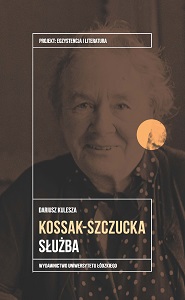Zofia Kossak-Szczucka. Służba
Zofia Kossak-Szczucka. The Service
Author(s): Dariusz Kulesza
Subject(s): Language and Literature Studies, Studies of Literature
Published by: Wydawnictwo Uniwersytetu Łódzkiego
Keywords: Zofia Kossak;Polish concentration camp literature;Polish Christian literature;Literature of the People’s Republic of Poland;Historical novel
Summary/Abstract: Zofia Kossak defined herself as a Catholic writer. In her opinion, Catholicism was the most effective in saving the temporal world. She also identified with literature that was in service of this salvation. The Catholic writing of Kossak was determined by family, Poland, and faith. The family was the centre of the world, where the writer experienced the initiation in life and history (The Blaze). Zofia Kossak described family in terms of what holds it together and saves (Ku swoim, Towards one’s own). In the last years of her life, she recognised family as a community that creates and is created by history (Dziedzictwo, The Heritage). Poland was described by Kossak as a land that had been heroically recovered, that was national and permanent. This also applied to regions, particularly Silesia (Nieznany kraj, The Unknown Land). However, the most important was Poland that was martyrologically (co)experienced, the country of war and occupation, concentration camps (Z otchłani, From the Abyss), Poland that was raised by her (Protest!). However, nothing was as valuable in the life and works of Zofia Kossak as faith. It was described by her starting from various forms of blessed madness (Szaleńcy Boży, The Madmen of God) through the uncompromising historical and historiosophical verification (Angels in the Dust) to existential source of Abraham’s truth (The Covenant). When looking for the position to place Kossak in Polish literature, the easiest way is to start with her historical novels that bring such antithetic contexts as the works of Sienkiewicz and Parnicki. Yet none of her texts, even those that were referenced and discussed here should be read without a confrontation with Christian literature, determined by such names as Kochanowski, Sęp-Szarzyński, and Norwid.
- E-ISBN-13: 978-83-8220-297-7
- Print-ISBN-13: 978-83-8220-296-0
- Page Count: 260
- Publication Year: 2021
- Language: Polish
- eBook-PDF
- Sample-PDF
- Table of Content

